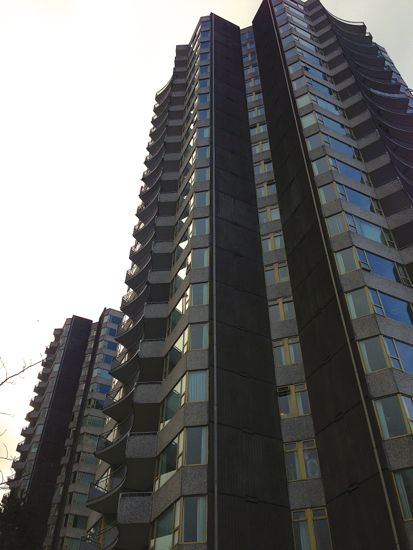Affordability and Beach Towers rezoning
The rezoning decision of Beach Towers is before Vancouver City Council on Tuesday February 26. Beach Towers are four rental apartment buildings on a whole city block in the West End with 3 towers on Beach Avenue and one on Harwood Street. There are 601 rental units in the complex and that represents about 3% of the rental units in the West End. The apartment buildings were built in 1960s. The rezoning would increase the number of rental units by 133 including some townhouses on Beach Avenue.
Here is the CoV staff report on the project for more details: rezoning report
The rezoning proposal is being brought forward by staff under the STIR program. The owner will have to sign a “housing agreement” with the city that will contractually guarantee that the new units will stay as rental units. I have written about STIR before:STIR
The STIR program is a tool for incentivising market construction of rental units. The current economics of Vancouver land prices, construction and development costs make the building of market rentals undesirable to development industry. Rezonings under STIR are not required to pay Community Amenity Contributions (CAC) Development Cost Levies (DCL) to help to make the creation of purpose built rental more economically viable.
Strangely with the Beach Towers rezoning city staff were able to negotiate with proponent of the project $1,249,913 for DCL, $243,00 for CAC (for the West End) and $181, 000 for public art on site and off. These payments raise the question that if this project was able to pay these amounts to the city why were the other big rezonings projects in the West End like 1401 Comox St. and 1225 Bidwell not required to make these payments? Were the densities granted in these past projects too generous?
Affordability
The city argues that the construction of market rate rental unit is “affordable” compared to buying. 50% of residents in Vancouver rent and many folks living and contributing to the city’s economic vitality will never be able to own. By being offered a comparison of something that one will not ever have is little comfort and more than a little odd. Even during the public hearings some councillors asked speakers if they thought going forward in the future if these units would affordable? Like government works on “time machine model” developing policy for the hypothetical future where solutions are delivered.
Typically new rental units are able to charge higher rents. Moreover, while new rental units will be cheaper than buying a new condo, it will make little impact on creating more affordability for residents. A significant intervention on affordability would for rents to be less than 30% of a household’s income including heating.
The city could negotiate in the “housing agreement” starting rents for 1/3 of the units to be 30% of the median income of a community to ensure that direct benefit flows to residents of surrounding a project. The city would also have to establish a process and criteria for selection. The city is under no legal obligation to grant a rezoning. Owners of the land pay for the value of the current zoning. The council will only grant a rezoning if it is in the “benefit” of the city of Vancouver. While residents of Canada and BC wait for their government to start a housing plan that provides direct money to cities and while residents waiting for the housing authority in Vancouver to take a direct capital position in housing projects to create more affordable housing, the city should mandate starting rents in new rezoning projects.

